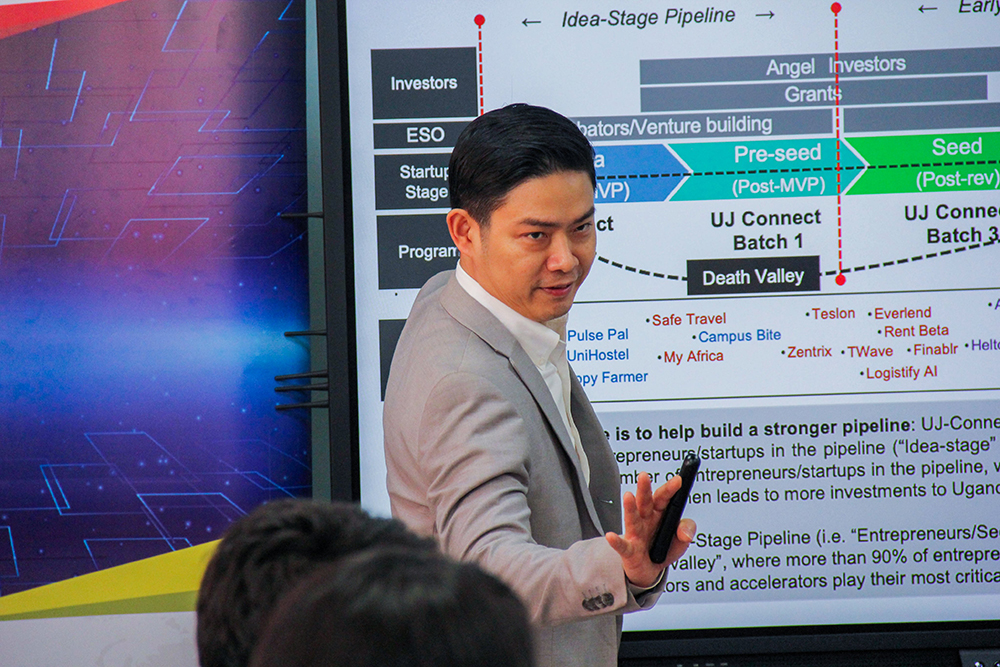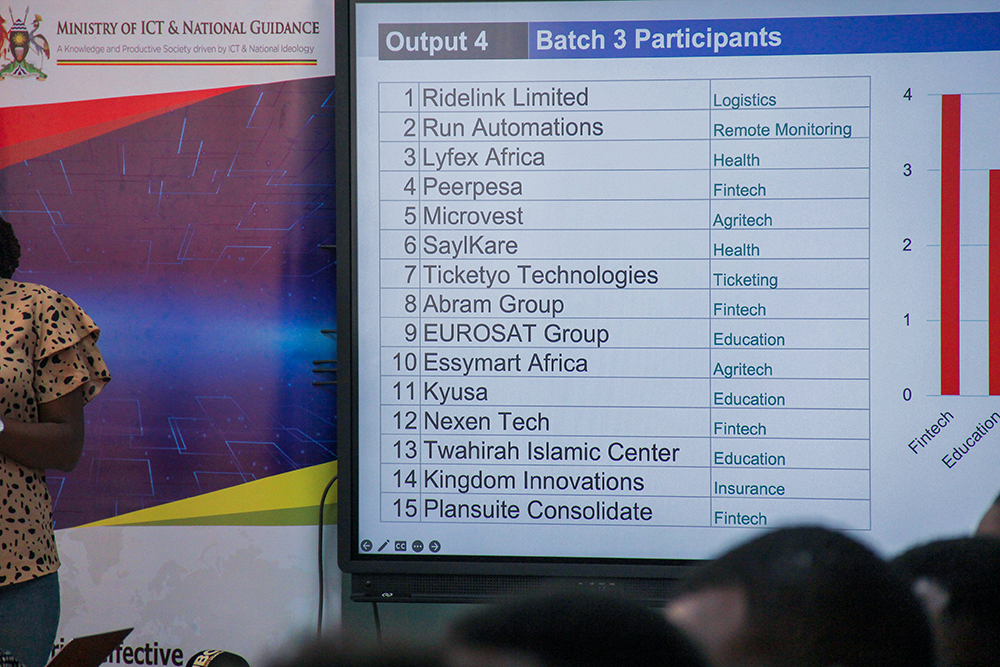Mentorship drive aims to turn Ugandan startups into global players
The initiative is part of the Uganda–Japan Connect programme, a Japan-funded project designed to catalyse homegrown digital solutions, create digital employment, and boost Uganda’s competitiveness in the global tech ecosystem.
The third phase of the mentorship programme for ICT-enabled startups on Friday, August 15, 2025. (Courtesy)
______________
The Japan International Cooperation Agency (JICA), in partnership with Uganda’s Ministry of ICT and National Guidance, has launched the third phase of its mentorship programme for ICT-enabled startups, aimed at helping entrepreneurs overcome the critical “Death Valley” stage, where most new businesses collapse.
The initiative is part of the Uganda–Japan Connect programme, a Japan-funded project designed to catalyse homegrown digital solutions, create digital employment, and boost Uganda’s competitiveness in the global tech ecosystem.
The programme aligns with Uganda’s National ICT Policy, which identifies digital innovation and entrepreneurship as key drivers of socio-economic transformation.
Jun Shiomitsu, a member of the JICA taskforce and CEO of AVODA Institute of Entrepreneurship, said the programme targets startups at different stages of development, guiding them from concept to market expansion. This was during the launch of the third phase of the mentorship programme for ICT-enabled startups at the National ICT Hub in Nakawa on Friday, August 15, 2025. (Courtesy)

(Courtesy)
Jun Shiomitsu, a member of the JICA taskforce and CEO AVODA Institute of Entrepreneurship, said the programme targets startups at different stages of development, guiding them from concept to market expansion.
“Our work is built around four key outputs. Number one is policy support for ICT development in Uganda," he said.
"Number two is human resource development — building real ICT skills. Number three is business matching, where we want Ugandan ICT-related startups to connect not just with Japanese companies and the Japanese market, but also globally. And finally, output four is mentorship for Ugandan ICT-enabled startups.”
Over four years, the initiative will run four batches of startups through distinct growth stages.
Batch one supported pre-minimum viable product (pre-MVP) startups — those developing prototypes but not yet selling products — while batch two focused on early-stage entrepreneurs still shaping their ideas.
“Batch three, which we are launching now, is post-MVP startup support,” said Shiomitsu.
“These companies already have a prototype and are either trying to get it to market or scale it up to the point where they can make at least $100,000 in annual revenue.”
Speaking during the launch at the National ICT Hub in Nakawa on Friday (August 15), Shiomitsu said the programme addresses the most vulnerable stage in startup growth.
Tackling high startup mortality
“In the startup world, we call this the death valley, where 90% of startups tend to die out,” said Shiomitsu. “This is why it is so important to have support from both the Government of Uganda through the Ministry of ICT and from JICA to help these companies climb out of that valley.”
Batch three will bring in experienced Ugandan and international mentors, as well as global venture capitalists, to guide startups towards sustainability and market expansion.
“We will work very closely with Ugandan mentors who understand the local market and have successfully scaled businesses nationally, regionally, and internationally. We will also bring in venture capitalists from around the world to guide these startups, because that’s something they really seek and desire.”
Shirley Nakyejwe, a senior ICT officer at the Ministry of ICT and National Guidance, said the programme is a strategic effort to bridge the gap between research, innovation, and the market.
“This mentorship and entrepreneurship programme enables entrepreneurs to interface with successful industrial players as well as facilitators and experts from within and outside the country,” she said.
Since its inception in 2023, the programme has graduated two batches. The first batch saw notable successes, including entrepreneurs travelling to Dubai to showcase their products, secure customers, and attract market opportunities from international partners.
Program goal
“Our goal is to ensure that products from our ecosystem are of a standard that is globally competitive,” Nakyejwe said.
“Many young people have interesting ideas, but there is often a missing link — having a product that is applicable within the industry and relevant to market needs.”
She expressed hope that the initiative would produce Uganda’s first “unicorn” — a startup valued at over $1 billion. “We want to see a unicorn within the ecosystem that has actually been produced from Uganda,” she said.
Nadia Nanteza, an innovator with LYFEX Africa and one of the participants in Batch 3, said she hopes to gain deeper guidance and broaden her networks.
“What I expect from the UJ-Connect programme is more mentorship,” Nanteza said. “Yes, I’ve received some mentorship, but knowledge is never harmful.”
She added that the Uganda–Japan partnership offers her a rare chance to step onto the world stage. “I expect to expand my connections because it is a Uganda–Japan relationship, and this is the meaning of a global stage for LYFEX Africa,” she said.
Growing contribution
Uganda’s ICT sector has been growing steadily, contributing 9% to GDP in 2023, according to the Uganda Communications Commission. However, challenges such as limited funding, skills gaps, and low market readiness have hindered the growth of startups.
Programmes like Uganda–Japan Connect aim to address these challenges by providing not just technical training, but also strategic business support and international exposure.